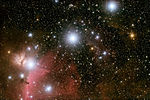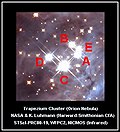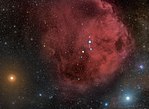List of stars in Orion (redirect from 16 Orionis)
by Pilcher, F. Archived from the original on 2012-02-27. Retrieved 2010-07-16. "Naming Stars". Retrieved 13 December 2017. Portals: Astronomy Stars Spaceflight...
51 KB (100 words) - 02:14, 5 November 2024
Mintaka (redirect from Delta Orionis)
Mintaka /ˈmɪntəkə/, designation Delta Orionis (δ Orionis, abbreviated Delta Ori, δ Ori) and 34 Orionis (34 Ori), is a multiple star system some 1,200 light-years...
25 KB (2,158 words) - 10:35, 26 October 2024
Alnitak (redirect from Zeta orionis)
It has the designations ζ Orionis, which is Latinised to Zeta Orionis and abbreviated Zeta Ori or ζ Ori, and 50 Orionis, abbreviated 50 Ori. The system...
14 KB (1,336 words) - 06:47, 26 October 2024
and Pi Orionis), and instead of an arm marked out by Mu Orionis, he holds a club (Chi Orionis). His right leg is represented by Theta Orionis and his...
46 KB (5,218 words) - 22:32, 25 September 2024
Iota Orionis (ι Orionis, abbreviated ι Ori) is a multiple star system in the equatorial constellation of Orion the hunter. It is the eighth-brightest member...
20 KB (1,728 words) - 08:45, 28 January 2024
Betelgeuse (redirect from Alpha Orionis)
at near-infrared wavelengths. Its Bayer designation is α Orionis, Latinised to Alpha Orionis and abbreviated Alpha Ori or α Ori. With a radius between...
174 KB (18,522 words) - 07:28, 1 November 2024
asterism consisting of π3 Orionis, ο1 Orionis, ο2 Orionis, 6 Orionis, π1 Orionis, π2 Orionis, π4 Orionis, π5 Orionis and π6 Orionis. Consequently, the Chinese...
14 KB (1,198 words) - 15:04, 18 September 2024
Meissa (redirect from Lambda Orionis)
Meissa /ˈmaɪsə/, designated Lambda Orionis (λ Orionis, abbreviated Lambda Ori, λ Ori) is a star in the constellation of Orion. It is a multiple star approximately...
19 KB (1,774 words) - 02:56, 15 November 2024
name FU Orionis is a variable star designation in the Argelander system, which are assigned sequentially as new variables are discovered. FU Orionis is about...
11 KB (1,053 words) - 17:34, 20 October 2024
Rigel (redirect from Beta Orionis)
constellation of Orion. It has the Bayer designation β Orionis, which is Latinized to Beta Orionis and abbreviated Beta Ori or β Ori. Rigel is the brightest...
71 KB (7,316 words) - 01:45, 30 October 2024
Alnilam (redirect from Epsilon Orionis)
constellation of Orion. It has the Bayer designation ε Orionis, which is Latinised to Epsilon Orionis and abbreviated Epsilon Ori or ε Ori. This is a massive...
17 KB (1,639 words) - 11:36, 10 November 2024
Saiph (redirect from Kappa Orionis)
Saiph /ˈseɪf/, designation Kappa Orionis (κ Orionis, abbreviated Kappa Ori, κ Ori) and 53 Orionis (53 Ori), is a blue supergiant star and the sixth-brightest...
13 KB (1,134 words) - 13:53, 26 October 2024
List of stars in Monoceros (redirect from 77 Orionis)
by Pilcher, F. Archived from the original on 2012-02-27. Retrieved 2010-07-16. "AAVSO Website". American Association of Variable Star Observers. Retrieved...
41 KB (111 words) - 13:01, 10 November 2024
Chi1 Orionis (χ1 Ori, χ1 Orionis) is a star about 28 light years away. It is in the constellation Orion, where it can be seen in the tip of the hunter's...
10 KB (790 words) - 13:58, 16 September 2024
by Knobel to be mistakes in transliteration or copy errors. Alnitak (ζ Orionis) is a triple star system at the eastern end of Orion's belt and is 1,260...
17 KB (1,734 words) - 04:32, 9 November 2024
Bayer designation Phi Orionis (φ Ori, φ Orionis) is shared by two star systems in the constellation Orion. Phi1 Orionis Phi2 Orionis The two stars are separated...
2 KB (217 words) - 00:51, 30 October 2024
V380 Orionis B, is a small, cool object of spectral type M5 or M6 that is either a red dwarf or brown dwarf. One of the component stars of V380 Orionis appears...
10 KB (1,066 words) - 02:59, 22 September 2024
Theta1 Orionis C (θ1 Orionis C) is a member of the Trapezium open cluster that lies within the Orion Nebula. The star C is the most massive of the four...
8 KB (572 words) - 05:45, 27 March 2022
V529 Orionis, also known as Nova Orionis 1678, is a variable star which is usually classified as a nova. It was discovered on 28 March 1678 by Johannes...
4 KB (399 words) - 13:51, 17 June 2023
Upsilon Orionis (υ Ori, υ Orionis) is a star in the constellation Orion. It has the traditional name Thabit /ˈθeɪbɪt/ or Tabit (ﺛﺎﺑﺖ, Arabic for "the...
12 KB (1,099 words) - 11:08, 22 August 2024
Phi1 Orionis is a binary star system in the constellation Orion, positioned less than a degree to the south of Meissa. It is visible to the naked eye...
8 KB (545 words) - 01:45, 23 August 2024
split luminosity classes for the O9s. The two MKK O9 V standards were Iota Orionis and 10 Lacertae. The revised Yerkes standards ("MK") presented listed in...
13 KB (1,582 words) - 03:07, 28 October 2024
Phi2 Orionis is a star in the constellation Orion, where it forms a small triangle on the celestial sphere with the nearby Meissa and Phi1 Orionis. This...
7 KB (436 words) - 13:58, 19 July 2024
Omicron1 Orionis (ο1 Ori) is a binary star in the northeastern corner of the constellation Orion. It is visible to the naked eye with an apparent visual...
10 KB (671 words) - 19:42, 18 July 2024
its more famous neighbour the Trapezium Cluster, also known as θ1 Orionis. θ2 Orionis consists of three stars in a line, each about an arc-minute from...
13 KB (1,250 words) - 03:53, 17 July 2024
Chi2 Orionis (Chi2 Ori / χ2 Orionis / χ2 Ori) /kaɪ.tuːˈɒraɪ/ is a B-type blue supergiant star in the constellation of Orion. It has an apparent visual...
10 KB (769 words) - 22:52, 22 August 2024
Sh 2-264 (redirect from Lambda Orionis Ring)
the Lambda Orionis Ring seen by the Spitzer Space Telescope. Young stars are forming in this region. Barnard 35, a part of the Lambda Orionis Ring seen...
4 KB (488 words) - 16:24, 7 August 2024
a result of its rapid rotation, Omega Orionis is a Be class star. Among the stars of this class, Omega Orionis was the first where the magnetic field...
9 KB (624 words) - 21:53, 20 September 2024
42 Orionis is a class B1V (blue main-sequence) star in the constellation Orion. Its apparent magnitude is 4.59 and it is approximately 900 light years...
6 KB (448 words) - 12:22, 22 August 2024














